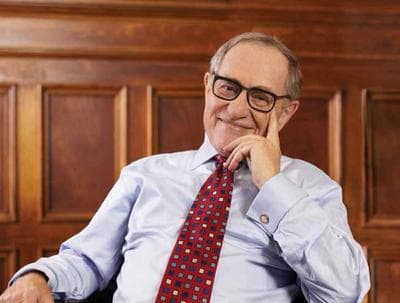Advertisement
Alan Dershowitz On His Life In The Law
Resume
Guest
Alan Dershowitz, lawyer, Harvard Law professor, and author of Taking The Stand: My Life in the Law.
Excerpt
Excerpt from the Introduction to
TAKING THE STAND: My Life in the Law
An autobiographer is like a defendant who takes the stand. We all have the right to remain silent, in life and in law. But if one elects to bear witness, he must tell the truth, the whole truth, and nothing but the truth, subject only to limited privileges, such as between a lawyer and a client, or a husband and a wife.
What Tocqueville observed two centuries ago—that in our country, great issues find their way into courts1—is even truer today. Accordingly, my autobiography will be a history of the last half century as seen through the eyes of a lawyer privileged to have participated in some of the most intriguing and important cases and controversies of our era. It is also an account of one man’s intellectual and ideological development during a dramatic period of world, American, and Jewish history, enriched with anecdotes and behind-the-scenes stories from my life and the lives of those I have encountered.
The law has changed considerably over the past half century. I have not only observed and written about these changes, I have helped to bring some about through litigation, writing, and teaching. This book presents an account of these changes and of my participation in the cases that precipitated them. My commitment to full disclosure requires that I not hide behind the distorting shield of feigned humility—calculated to preempt criticism—that denies the reader an accurate picture of the impact the author has had on events.2 (One of my favorite jokes is about feigned humility: The pompous rabbi prostrates himself on Yom Kippur, shouting to God, “I am nothing before you.” The equally pompous cantor emulates the rabbi, shouting even louder, “I am less than nothing before you.” The lowly sexton (“shammes”), seeing the rabbi and the cantor engaging in such self-flagellation, also gets down on his knees and screams, “I too am nothing.” The rabbi looks contemptuously at the sexton and whispers to the cantor, “Look who’s claiming to be nothing.”) Nor will I rewrite my past to conform to present notions of political correctness. Instead, I will try to offer an honest assessment of the roles I have played—for better or worse—in legal developments.
You may have witnessed my public persona—confrontational, unapologetic, brash, tough, argumentative, and uncompromising. These characteristics have provoked strong reactions, both positive and negative, rarely neutral. Yet those who know me—family, friends, and colleagues—hardly recognize the “character” I come across as on TV. In my personal life, I shy away from confrontation and am something of a pushover. My son Elon says that when people bring me up in conversation, he can instantly tell whether they know me from TV or from personal interactions—whether they know what he calls “the Dersh Character” or “the real Alan.”
This sharp dichotomy between my public and private persona was brought home to me vividly when a motion picture, Reversal of Fortune,3 was made about the Claus von Bülow case. I was played by Tony Award–winning actor Ron Silver.
The opening scene had my character playing an energetic basketball game with himself—true enough. When he’s interrupted by a phone call giving him the news that he has lost a case involving two brothers on death row,4 he smashes the phone on the pavement. When I complained to my son, who had coproduced the film, that I don’t throw phones, my son responded: “Dad, the person on the screen isn’t you; it’s ‘the Dersh Character.’ ” He explained that characters have to “establish themselves” early in a film, and that this establishing was intended to convey my passion for the rights of criminal defendants. “If we had several hours, we could have recounted your involvement in many other cases, but we had about a minute; hence the smashed phone.”
“That scene doesn’t show passion,” I said. “It shows a temper tantrum.” My son explained that a character has to have faults, so that he can “overcome” them. “The viewing audience has to see you grow.”
In the film, I’m portrayed as a person whose passions are reserved exclusively for his professional life. I hope that’s not me, although I have to acknowledge that people who know me only professionally assume that I have nothing left for those I love. They see me busily at work in different jobs—professor, author, litigator, lecturer, and television commentator—and they assume that either I never sleep or that there are several of me. But the fact is that I reserve a lot of love, loyalty, and friendship for family and people close to me. I even make time for having fun—ball games, concerts, walks on the beach, parties, jokes, and schmoozing.
In this book, I intend to explore both sides of my life, the interaction between them, and how they are both the products of my early upbringing and lifelong experiences. So if you think you know me from my public appearances, you may be in for a surprise.
Excerpted from TAKING THE STAND by Alan Dershowitz. Copyright © 2013 by Alan Dershowitz. Excerpted by permission of Crown Publishing Group, a division of Random House LLC, a Penguin Random House Company. All rights reserved. No part of this excerpt may be reproduced or reprinted without permission in writing from the publisher.
This segment aired on October 24, 2013.